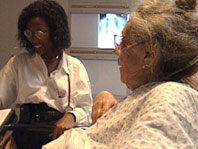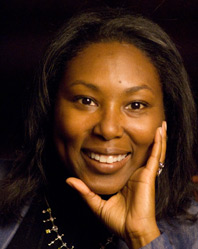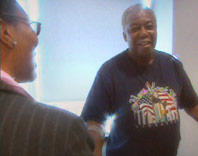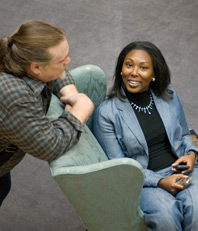Luanda GrazetteArriving at an unexpected placeNOVA: What are you now doing in your career? Luanda Grazette: I work for a pharmaceutical company called AmGen. I'm one of a small handful of cardiologists there. I participate in drug development and also help define safety procedures for drugs that are in testing. Q: What made you take the leap from clinical medicine? Luanda: I have always been interested in science and was doing quite a bit of research as a cardiologist at Mass General [Massachusetts General Hospital, one of the Harvard teaching hospitals]. I had primarily focused on areas of drug toxicity, unexpected side effects. So, this job is related to my earlier research. Q: Did you ever think you would end up where you are now? Luanda: Even three, four years ago, I would not have predicted that I would be working for a pharmaceutical company. But when I was approached for this job, I realized I had an opportunity to have a huge impact on the care of patients, not just with heart failure but with a whole host of diseases. I could work on drugs used by hundreds of thousands of people. The impact my current work could have now is huge compared to the impact that I could have as a bench scientist, although that work was a heck of a lot of fun. I enjoyed every minute of it. Q: Do you miss seeing patients? Luanda: I do miss patient care. That is the one area that's unresolved for me. The scientific intrigue and intellectual challenge, it's all there in my current position. But direct patient care—interacting with patients and participating in their lives—is a privilege. I enjoyed it a great deal. Q: What do you think about being at this stage of your life? Luanda: I'm at a really good place right now. I remember when I was much younger, and I would hear people who were probably about my age now say, "You couldn't pay me enough to be 20 again." I would think, "You are mad as a hatter. It's the greatest thing in the world to be 20." But it's not true. I mean, I'm at a place in my life where I've done some really interesting things. I know that I have been blessed by circumstance and by people in my life. I have great friends and family. I live in a beautiful place. I have a really interesting job. And there are still many possibilities ahead for me, as long as a meteor doesn't crash right now. [laughs] Getting thereQ: With the long years of medical school and training, do you think you've had to sacrifice a lot to get to this place in your career? Luanda: I wanted to be a physician. I had a great time in medical school. I spent long years in training, but that's part of the package. I never really thought of it as a sacrifice. I'm a hard-driving person. If I were an interior decorator, I would be an interior decorator who was up on her computer at night at 12, 1 a.m. looking for fabric bazaars in Istanbul. That's my personality. Q: What did you hope your career would be like when you went to medical school? Luanda: When I first went to Harvard, I had a completely different idea about what my career would be, and also about what it was that doctors did. I don't think that's unusual. For most of us who didn't have a parent or other close relative who was a physician, we didn't have a clue about how doctors actually spend their time. When I went to Harvard, I thought I was going to be a pathologist with a research lab. I wanted to be in a field where I could think about complex problems and then do research to try to solve them. I'm doing that now, but in a completely different venue. "You have to tap dance and juggle and flip an omelet at the same time to get the same trust and respect as the guy who looks like Dr. Kildare." Q: When you were at Mass General, you were both doing research and seeing patients. Is it hard to pursue both paths—research and clinical practice? Luanda: I think it's getting increasingly difficult to be a physician-scientist, to manage both careers, with the current economic situation in terms of both what's required for clinicians seeing patients and also what's required for scientists to maintain their funding. There's a generation of physician-scientists, clinician-scientists, who are being lost from academia. Years ago, there were ways for hospitals to support junior investigators during periods when they were getting on their feet funding-wise. And funding for research was more available. Someone asked me earlier about how rare it was for physicians to go into industry. It's not rare at all any more. Even for very senior level people, this is a more viable decision for people who want to be intellectually active. Straight talkQ: What do you tell young people who ask you if they should go to med school? Luanda: I give the same answer that I've heard a number of other people give: Do it if you can't think of anything else that you want to do, because only in that situation are the sacrifices worth it. If you think you might be equally happy being a botanist, then you should be a botanist. Now, that being said, I don't regret for a minute that it's the profession that I chose. I love being a physician. I love being a cardiologist. Q: Would you like to have kids? Luanda: Yeah. It's not something that keeps me up at night, though. I like other peoples' kids. If I had really wanted to have kids, I'd have them. I mean, I've been married. Q: You're a pretty straight shooter, pretty direct. Luanda: I probably have become more direct because I don't have a lot of time. I have a fairly low tolerance for things that I feel are a waste of my time. That's something that begins during medical school. Being direct saves a lot of time. Q: Do you imagine you'll still be doing what you are doing now in 10 years? Luanda: I'm probably too restless to be in the same spot 10 years from now. Q: Looking back at your career, are there things you would do differently? Luanda: It's hard to say, because, as we know from science fiction, if you start tampering with time lines, you never know where you'll end up. There are certainly some individual things that I would do differently. But I wouldn't want to end up anywhere else than where I am now. Becoming Dr. GrazetteQ: When you watch footage of yourself in medical school, what does it make you think? Luanda: It's almost like looking at a different person. I still look like that person, but I don't feel like her. Q: You didn't seem as shocked by your first anatomy class as some of the other students. Luanda: I had been exposed to cadavers before, because I was a teacher's assistant in anatomy at The University of Alabama, Birmingham. That was how I partly put myself through college. Q: Do you remember situations in your medical training where you felt the older doctors were treating you and other students with humiliation? Luanda: Oh sure. There were lots of people for whom humiliation was the preferred teaching method, especially during my fellowship. It was almost cartoonish, like some bad version of an evil British public school. Q: We filmed with you when you watched a patient die for the first time. What was that like? Luanda: As a first experience with death, this sort of sounds a little bizarre, but I don't think it could have been much better. Mr. Rizzo [the patient] and his family were just lovely, genuine people. I treasured being a part of their care team. And the physician who was primarily responsible for him was also a lovely, genuine person, who handled the case with such grace. "At the end of the day, people are going to have a perception of me that won't necessarily have anything to do with me." Q: Do you think you've faced particular challenges because you don't fit the old stereotype of what a doctor, or a cardiologist, looks like? Luanda: It's been tough at times. Sometimes even the most well-meaning people have these assumptions, and they feel, "Oh, isn't that sweet. There's one of those lady docs," or, "There's a black lady cardiologist." Probably the most difficult thing for anyone who doesn't fit the Dr. Kildare stereotype is that you don't get the benefit of the doubt. You have to tap dance and juggle and flip an omelet at the same time to get the same trust and respect as the guy who looks like Dr. Kildare. It's a hurdle, but it's not insurmountable. It's just sort of annoying. One funny story along those lines: I had this patient on whom I had just done a procedure where we put a catheter into a blood vessel and sneak it up through the aorta and then to the heart. I had done a good job. I was really proud of myself. And after the procedure, I went to the guy's room to tell him how well it had gone and what we had found, da-di-da-di-da. He just stared at me, and at the end he looks at my ID and said, "That M.D. on your name tag, is that part of your name?" And I said, "Ah, no. I'm Dr. Grazette. [laughs] I'm the person who did your procedure." He just couldn't accept it. He just couldn't hear it. And we went through it again, and then he asked me, "Well, when is the doctor gonna come around and tell me about my procedure?" [laughs] Things like that happen. I just have to make sure that they don't break my stride and they don't keep me from pursuing the things that I want to pursue, and achieving what I want to achieve. Some regretsQ: When you look back at your clinical practice, what do you miss the most? Luanda: What sticks out for me most are memories of when I worked in these little health clinics where people are doing more with less. Just before I left Mass General, I had a heart failure general cardiology practice at Revere Healthcare Center. Revere is a working-class neighborhood outside Boston. This center was wonderful, staffed by these very dedicated, really smart physicians and nurses and therapists and pharmacists. The people that I interacted with there, because they were all so dedicated, really inspired me. And when I think about my transplant patients in that clinic, my mind sort of drifts back to "Hmmm. Maybe that's what I should be doing. Maybe I should go back to patient care." Q: How do you feel about having been involved in this documentary? Luanda: I have to be honest. I've disliked it more than I've liked it. When you asked me to be involved the first time, I think it was probably a week or two before I said yes. I thought, "Well, it's probably a good thing that you're doing this, and won't it be nice to have a record." But I am a very private person. I can command attention when I need to in my professional life, but I'm not a person who needs to go, "Hey look at me." So, it's been uncomfortable.
At the end of the day, people are going to have a perception
of me that won't necessarily have anything to do with me. It
will relate to how you edit these scenes together, and the
narrative that you decide to give it. I'm probably too much of
a control freak to be comfortable with that. |


Watch Luanda Grazette's journey from med school to midlife in scenes from "Doctors' Diaries." (Running time 9:44) 
As a first-year medical student, Luanda was uncertain that she wanted to put her life in front of the lens, but filmmaker Michael Barnes convinced her it would be worthwhile. 
Raised, in part, by her grandmother, Luanda took naturally to interacting with older patients, which suited her well for cardiology. |
|
|
|
|
Interview conducted in June 2008 by Michael Barnes, producer of "Doctors' Diaries," and edited by Susan K. Lewis, senior editor of NOVA Online Doctors' Diaries Home | Send Feedback | Image Credits | Support NOVA |
© | Created February 2009 |
|
|
|









